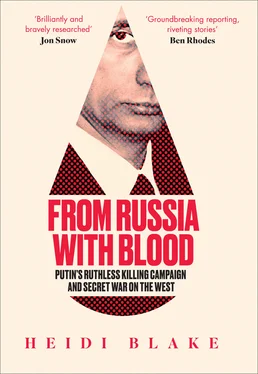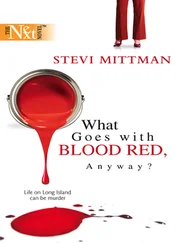The British government had no option but to act. On March 12, eight days after the Skripals collapsed, the prime minister announced on the floor of the House of Commons that it was “highly likely” that Vladimir Putin was responsible. “Either this was a direct act by the Russian state against our country, or the Russian government lost control of this potentially catastrophically damaging nerve agent,” she said, demanding an explanation from the Kremlin by midnight the following day. Russian officials hit back immediately, calling the remarks a provocation and describing the prime minister’s statement as a “circus show in the British parliament,” but no explanation was forthcoming. Two days later, May announced the expulsion of twenty-three Russian spies operating under diplomatic cover in London. Russia quickly followed suit, ejecting twenty-three British diplomats from Moscow.
The accusation that Russia had carried out a chemical weapons attack in Britain sparked an unprecedented international reaction, leading to the expulsion of more than 150 Russian diplomats from twenty-eight Western countries. The leaders of the United States, Britain, France, and Germany issued a joint statement condemning Russia for “the first offensive use of a nerve agent in Europe since the Second World War,” describing the attack as “an assault on UK sovereignty” and a breach of international law that “threatens the security of us all.” The fallout plunged relations between Russia and the West to the kind of subzero temperatures not seen since the end of the Cold War. For a Britain increasingly isolated by its decision to leave the European Union, the attack on the Skripals had occasioned a heartening show of international solidarity. And, at least ostensibly, it enabled a prime minister beleaguered by bruising failures in the Brexit negotiations to reposition herself as a redoubtable global stateswoman. But back in Moscow, Putin was looking on with scarcely disguised glee.
The West’s response to the attempted assassination of the Skripals could not have been more of a gift to the man in the Kremlin. The Russian presidential elections fell on March 18—a fortnight after the attack—and Putin needed to mobilize his electorate. True, he did not have much competition. The opposition figurehead, Alexei Navalny, had been repeatedly attacked and imprisoned during his campaign before ultimately being banned from running, and Putin’s previous leading opponent, Boris Nemtsov, had been gunned down on a bridge outside the Kremlin three years earlier. The election result was a foregone conclusion. But Putin wanted a resounding victory as he closed his grip on another six years in power, and that meant getting a strong turnout at the polls. To achieve his goal, he needed to rouse the Russian people into a state of patriotic fervor and distract them from the dire state of Russia’s sanctions-stricken economy, rampant corruption, crumbling infrastructure, chronically underfunded health service, and failing education system. What better way to do that than to invoke the looming menace of Russia’s enemies in the West, from whom only he could be trusted to defend the motherland?
That had been the principal objective of the state of the nation address Putin delivered three days before the attack on the Skripals, in which he announced that Russia had developed a new arsenal of nuclear missiles capable of penetrating US air defenses. Squaring up to the podium in a sharp-shouldered black suit and deep-red tie, he declared: “I would like to tell those who have been trying to escalate the arms race for the past fifteen years, to gain unilateral advantages over Russia, and to impose restrictions and sanctions…The attempt at curbing Russia has failed.” Behind him, two vast screens lit up with footage of snow-covered rocket launchers blasting gigantic missiles into a glowering sky, followed by animations charting a ballistic trajectory encircling the entire globe.
Putin’s warmongering state of the nation was the first turn in his well-practiced pre-election performance as a global strongman, and the attack on the Skripals made the perfect sequel. After Britain pointed a finger at the Kremlin and the countries in the United States–led NATO alliance followed suit, all the mechanisms of the Russian state went into overdrive to whip up national hysteria about the iniquity of its Western enemies. Even by the prodigious standards of the Russian propaganda machine, rarely had such a dazzling variety of alternative conspiracy theories been spewed out by the state’s multiplicity of troll factories, fake-news farms, and organs of agitprop. Britain had deliberately put the Skripals into a coma and fabricated evidence to frame Russia—or to detract attention from its difficulties in the Brexit negotiations, or to smear Putin ahead of the presidential election or to destroy Russia’s reputation as a “peacemaker” in Syria, or out of sour grapes over having lost the right to host the 2018 World Cup. MI6 had poisoned Skripal out of fears he would flip and start selling British secrets back to Moscow. The pro-Western government of Ukraine was behind the attack. Sweden, Slovakia, or the Czech Republic was responsible. A mafia group had taken out a contract on the Skripals. The Novichok had originated from the lab at Porton Down, or the United States had made its own version of the nerve agent or stolen it while performing chemical weapons inspections in former Soviet states. So the theories wound on and on.
Sergei Naryshkin, the director of Russia’s Foreign Intelligence Service, called the poisoning a “grotesque provocation rudely staged by the British and US intelligence agencies”—and Putin himself was scornfully dismissive, describing Britain’s accusations as “delirium and nonsense.” But the president and his propagandists also took care to fan the flames of suspicion.
Three days after the attack on the Skripals, before Britain had publicly accused Russia of the attempted assassination, the Kremlin’s Channel One TV station used the main bulletin of its flagship current affairs show to issue an unambiguous warning. Skripal was “a traitor to his country,” the host said. “I don’t wish death on anyone,” he continued, “but for purely educational purposes, for anyone who dreams of such a career, I have a warning: being a traitor is one of the most dangerous professions in the world.” Anna Chapman, the glamorous linchpin of the network of ten Russian sleeper agents caught spying on the United States in 2010, also publicly accused Skripal of treachery. And, on the cusp of the presidential election, Putin himself used a specially commissioned documentary to issue his own monition. Asked by the handpicked interviewer if he was capable of forgiveness, the president nodded. Then a glacial smile crept across his face.
“But not everything,” he said. The interviewer wanted to know what it was the president could not forgive.
“Betrayal,” Putin spat back.
The Russian people are used to living with this sort of cognitive dissonance. This is how a nation is hypnotized: sowing confusion with conspiracy and contradiction, distorting debate with disinformation, and muddying fact with falsehood so that the collective consciousness is clouded by a perpetual fog of ambiguity in which nothing is true and no one is accountable. Sergei Skripal betrayed the motherland by selling Russian secrets to the West—and Putin is a strongman, so traitors will kick the bucket. The West is smearing Russia with false accusations to threaten its power—and Putin is a strongman, so only he can save the nation. These were the dissonant messages that the people of Russia received—and, by and large, believed.
When election day came, Putin swept to victory with 77 percent of the vote and a turnout of more than two-thirds of the population. Almost as soon as the polls had closed on March 18, his campaign spokesman attributed the success to a single event.
Читать дальше












